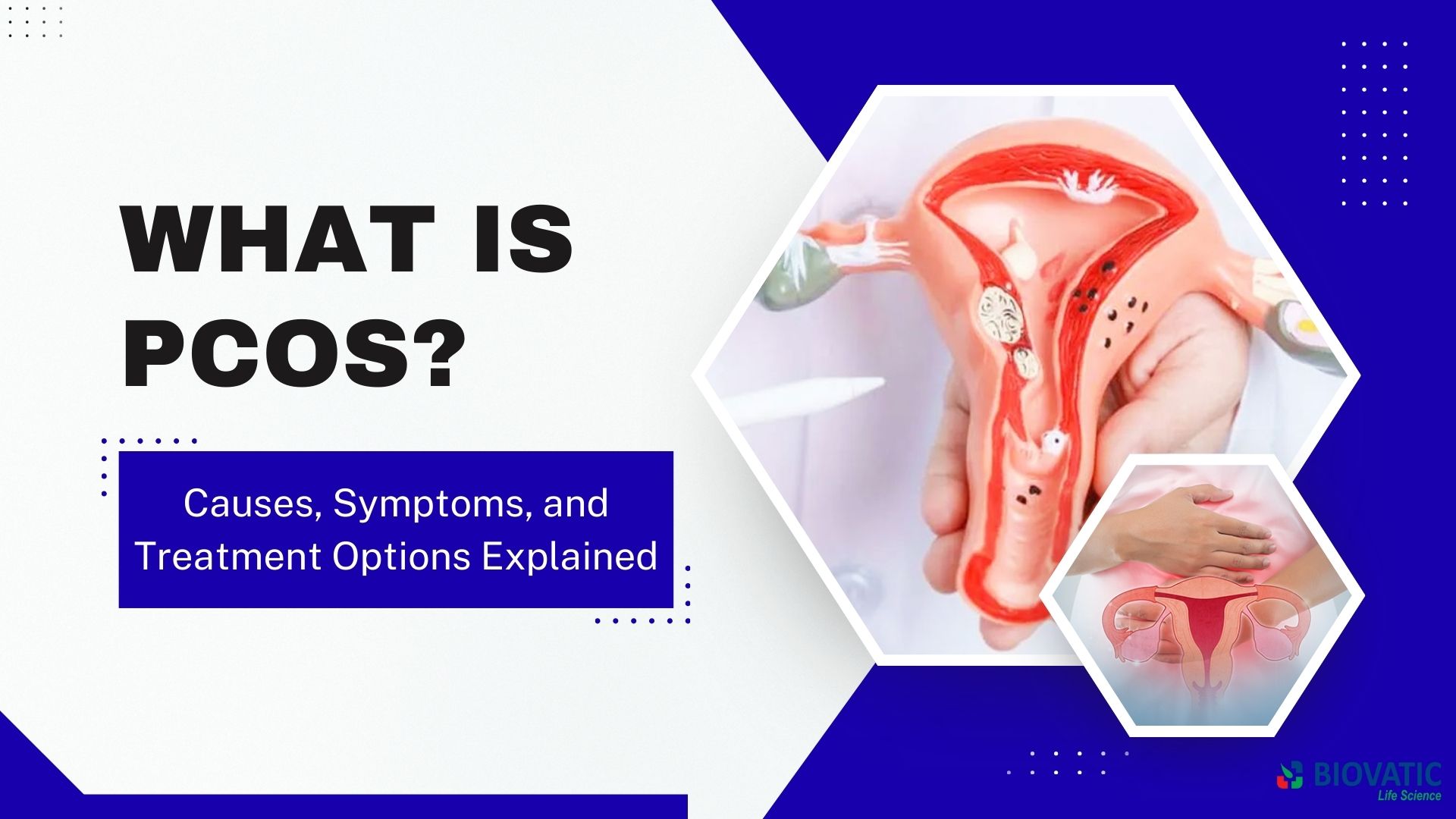- 2025-09-17
- Gynaecology
Polycystic Ovary Syndrome (PCOS) is one of the most common

Polycystic Ovary Syndrome (PCOS) is one of the most common hormonal disorders affecting women of reproductive age. Despite being highly prevalent, it is often misunderstood or left undiagnosed for years. PCOS is not just a condition that impacts fertility it influences a woman’s overall health, metabolism, and even emotional well-being. Understanding PCOS in depth is the first step toward better management, effective treatment, and a healthier life.
PCOS is a hormonal imbalance that affects how the ovaries function. In this condition, the ovaries may produce higher-than-normal levels of androgens, which are male hormones present in small amounts in women. This imbalance disrupts the menstrual cycle, sometimes preventing ovulation altogether. Women with PCOS often develop small fluid-filled sacs (cysts) in their ovaries, though not every woman with PCOS has visible cysts.
While the exact cause is not fully understood, researchers link PCOS to factors such as genetics, insulin resistance, and lifestyle. It is also considered a lifelong condition that requires ongoing management rather than a one-time cure.
Though PCOS is multifactorial, several underlying causes are believed to contribute to its onset:
Hormonal Imbalance: Excess androgens interfere with normal ovulation and menstrual cycles.
Insulin Resistance: Many women with PCOS have insulin resistance, which means their body struggles to use insulin effectively. This can lead to weight gain and increases the risk of type 2 diabetes.
Genetics: A family history of PCOS or type 2 diabetes can make a woman more susceptible.
Lifestyle Factors: Poor diet, lack of physical activity, and stress may worsen symptoms, though they may not directly cause the condition.
Understanding these root causes helps doctors create more personalized treatment strategies for women dealing with PCOS.
PCOS affects women differently, but certain signs are commonly reported. Recognizing these symptoms early can help women seek timely medical advice.
Some of the most frequent symptoms include:
Irregular or missed periods
Difficulty conceiving due to irregular ovulation
Excess facial or body hair (hirsutism)
Weight gain or difficulty losing weight
Thinning scalp hair
Oily skin and acne
Darkened skin patches, especially around the neck or underarms
These symptoms can impact not only physical health but also self-esteem and emotional well-being, making PCOS a condition that requires holistic attention.
PCOS is not just a reproductive disorder; it can influence long-term health outcomes. Women with PCOS are at a higher risk of developing:
Type 2 diabetes
High cholesterol and hypertension
Sleep apnea
Depression and anxiety
Endometrial cancer (due to prolonged lack of ovulation)
Because of these risks, doctors emphasize early diagnosis and lifestyle management as critical components of care.
Diagnosis is usually based on a combination of clinical symptoms, medical history, and specific tests. Doctors often rely on the Rotterdam Criteria, which requires two out of three signs: irregular periods, excess androgen levels, and polycystic ovaries visible on ultrasound.
Blood tests may also be recommended to check hormone levels, insulin, and cholesterol. An early diagnosis not only helps in symptom management but also reduces long-term health risks.
Treatment for PCOS is highly individualized, as it depends on the woman’s age, symptoms, and whether she is planning pregnancy. While there is no permanent cure, several management options are effective in controlling symptoms.
Doctors often recommend lifestyle changes as the first line of treatment. A balanced diet rich in whole grains, lean proteins, and vegetables combined with regular exercise can significantly improve insulin sensitivity and weight management. Stress reduction through yoga or meditation is also beneficial.
For women struggling with irregular periods, doctors may prescribe medications to regulate menstrual cycles. Those with fertility concerns may be given ovulation-inducing medicines. Women experiencing excess hair growth or acne may benefit from hormonal therapies that reduce androgen levels.
Many women require ongoing support through gynaecology medicines, which help manage irregular cycles, control symptoms, and improve overall reproductive health. These treatments are prescribed carefully after evaluating individual needs, ensuring that every woman gets a safe and effective plan suited to her body.
PCOS often has an overlooked side to its psychological impact. Many women with PCOS experience anxiety, depression, or low self-esteem due to visible symptoms such as weight gain or excess hair. Seeking counseling, joining support groups, or engaging in mental wellness practices can help women navigate the emotional challenges that come with PCOS.
If you are experiencing irregular periods, unexplained weight changes, difficulty conceiving, or other common PCOS symptoms, it is important to consult a gynecologist without delay. Early intervention can make a significant difference in managing symptoms and preventing long-term complications.
PCOS is a complex hormonal disorder that affects millions of women worldwide, and its impact extends beyond reproductive health. From irregular cycles to long-term risks like diabetes and heart disease, PCOS requires awareness, early diagnosis, and ongoing management. With the right lifestyle changes, medical support, and access to gynaecology medicines, women can manage PCOS effectively and lead healthier lives. Empowering women with knowledge and encouraging timely consultation with specialists is key to better outcomes in PCOS care.
Q1: Can PCOS be completely cured?
No, PCOS cannot be completely cured, but with proper treatment and lifestyle changes, its symptoms can be effectively managed.
Q2: Is PCOS only about fertility issues?
No, PCOS also affects metabolism, hormonal balance, and long-term health risks such as diabetes and cardiovascular conditions.
Q3: Can diet alone help in managing PCOS?
A healthy diet plays a big role, but medical treatment and regular monitoring are often necessary for comprehensive management.
Q4: Are gynaecology medicines safe for PCOS management?
Yes, when prescribed by a qualified gynecologist, gynaecology medicines are safe and effective for managing specific symptoms of PCOS.
Q5: What age group is most affected by PCOS?
PCOS typically affects women in their reproductive years, but its signs can begin as early as adolescence.
Polycystic Ovary Syndrome (PCOS) is one of the most common
The healthcare sector is evolving at a rapid pace in India, and
